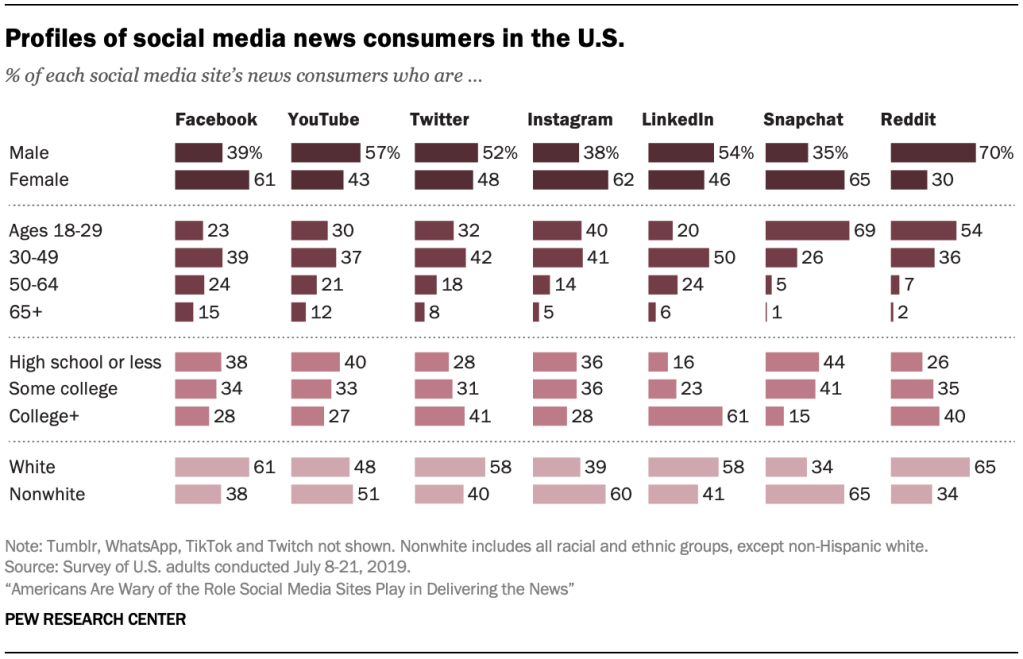As heated debate continues over how social media sites can improve the quality of news on their platforms while enforcing rules fairly, most Americans are pessimistic about these efforts and are highly concerned about several issues when it comes to social media and news.
Majorities say that social media companies have too much control over the news on their sites, and that the role social media companies play in delivering the news on their sites results in a worse mix of news for users. At the same time, social media is now a part of the news diet of an increasingly large share of the U.S. population.
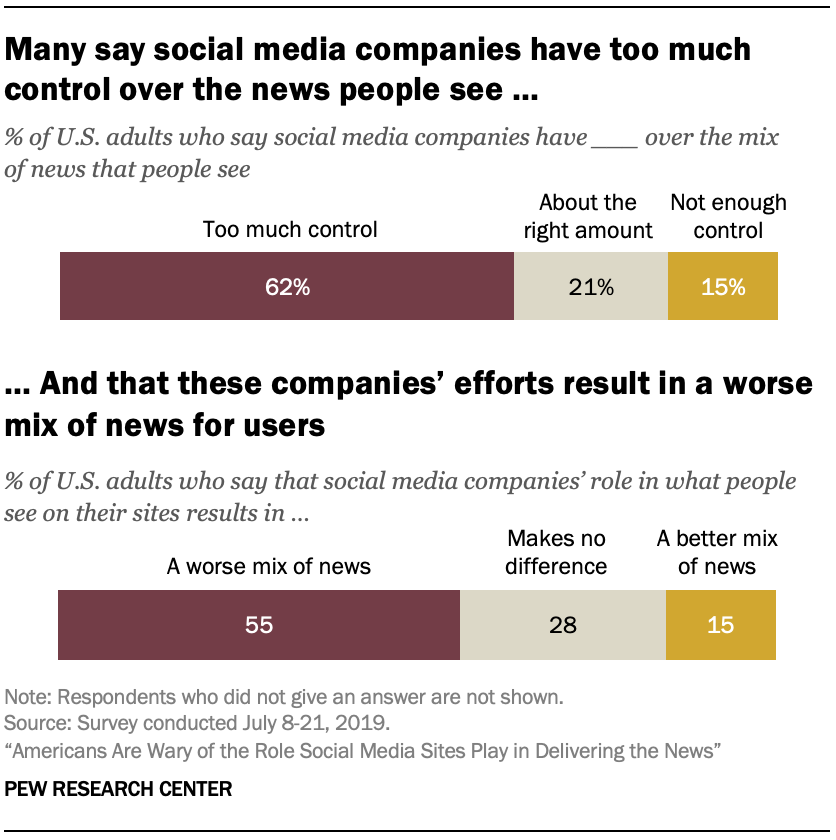
These findings are based on a survey conducted July 8-21, 2019, among 5,107 U.S. adults who are members of Pew Research Center’s American Trends Panel. The study also examines Americans’ perceptions of the biggest problems when it comes to social media and news, the political slant of news posts they see on social media, and which sites they go to for news.
Almost all Americans – about nine-in-ten (88%) – recognize that social media companies have at least some control over the mix of news people see. And most Americans feel this is a problem: About six-in-ten (62%) say social media companies have too much control over the mix of news that people see on their sites, roughly four times as many as say that they don’t have enough control (15%). Just 21% say that social media companies have the right amount of control over the news people see.
The largest social media platforms control the content on their feeds using computer algorithms that rank and prioritize posts and other content tailored to the interests of each user. These sites allow users to customize these settings, though previous research has found that many Americans feel uncertain about why certain posts appear in their news feed on Facebook specifically. Social media companies have also been public about their efforts to fight both false information and fake accounts on their sites.
While social media companies say these efforts are meant to make the news experience on their sites better for everyone, most Americans think they just make things worse. A majority (55%) say that the role social media companies play in delivering the news on their sites results in a worse mix of news. Only a small share (15%) say it results in a better mix of news, while about three-in-ten (28%) think their efforts make no real difference.
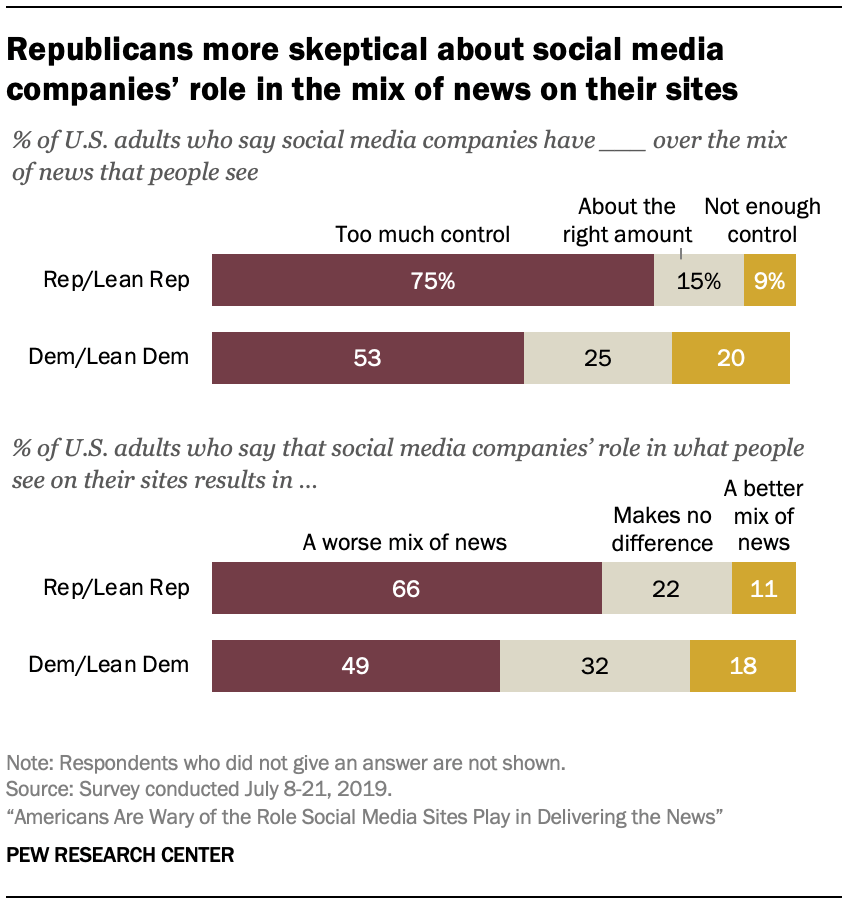
While most Americans are pessimistic about the control social media companies have over the news people see, Republicans tend to be more negative than Democrats. Three-quarters of Republicans and Republican-leaning independents say social media companies have too much control over the mix of news that people see, compared with about half (53%) of Democrats and Democratic leaners. More Republicans (66%) than Democrats (49%) also say that these efforts result in a worse mix of news for users.
Most say that social media companies favor certain types of news organizations
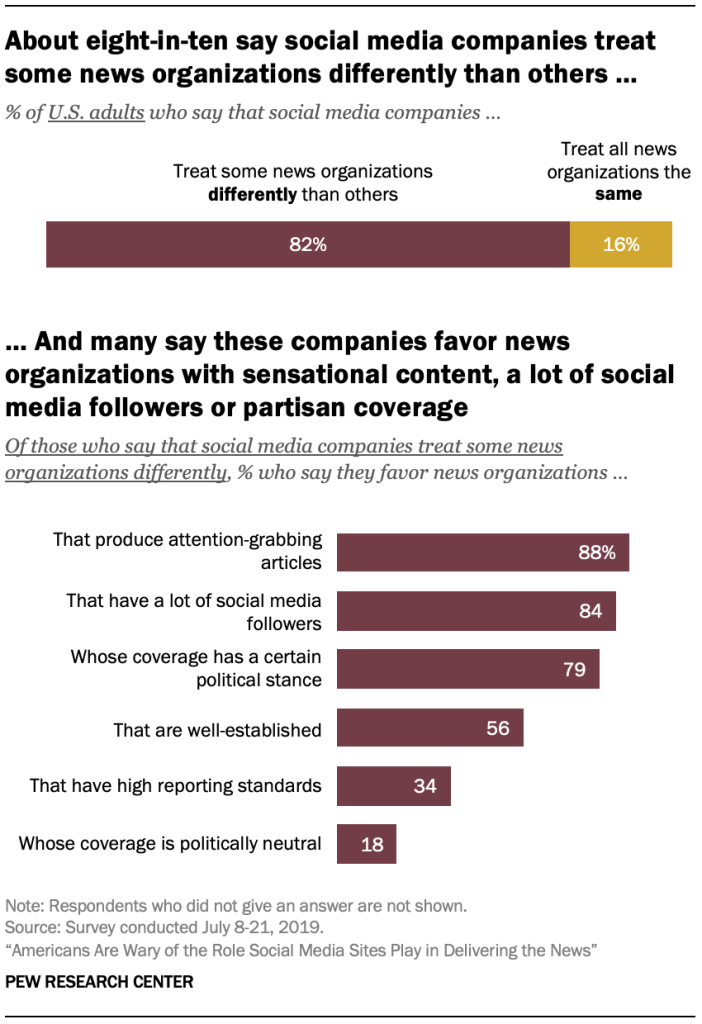
A large majority of Americans believe that social media companies favor some news organizations over others. About eight-in-ten U.S. adults (82%) say social media sites treat some news organizations differently than others, about five times the share saying all news organizations are treated the same (16%).
Social media companies do have established policies when it comes to publishers, including prioritizing certain news sources, banning or limiting others that produce lower-quality content, and using their monetization policies to discourage particular behaviors.
Among those U.S. adults who say social media companies treat some news organizations differently than others, there is broad agreement that they favor three types: those that produce attention-grabbing articles (88%), those with a high number of social media followers (84%) and those whose coverage has a certain political stance (79%).
While large social media companies have announced initiatives to favor high-quality news publishers in an effort to improve the news on their sites, fewer who say some news organizations are treated differently believe social media companies favor organizations that are well-established (56%), have high reporting standards (34%) or have politically neutral coverage (18%).
Americans are most concerned about biased and inaccurate news on social media; many say the news content they see leans left
Many people – including President Donald Trump – have voiced concerns about social media companies potentially censoring the news that people see, whether by hiding posts or by banning specific users.
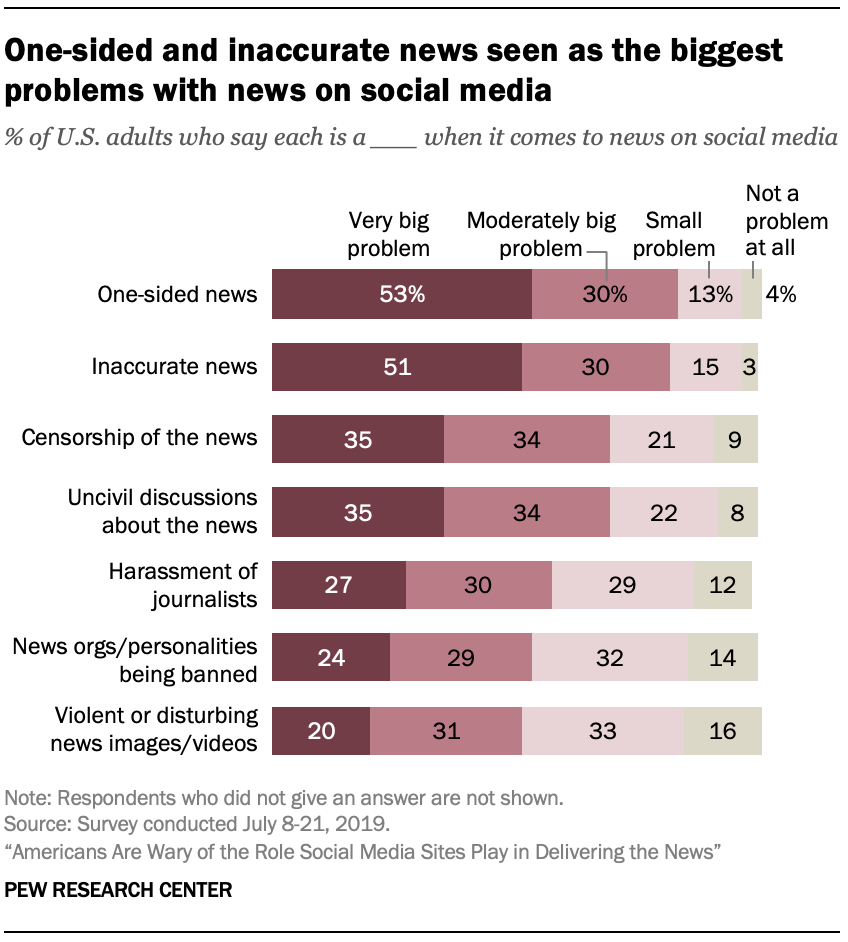
But in spite of the public discussion around potential censorship and efforts to monitor it, Americans are more concerned with the overall low quality of news available on social media sites. Of the seven issues asked about, about half of U.S. adults say that one-sided news (53%) and inaccurate news (51%) are very big problems when it comes to news on social media. Fewer say that censorship of the news (35%) or news organizations or personalities being banned (24%) are very big problems.
As large majorities say that the tone of American political debate has become more negative in recent years, about a third of U.S. adults (35%) say that uncivil discussions about the news are a very big problem when it comes to news on social media. Additionally, about a quarter (27%) say that the harassment of journalists is a very big problem associated with news on social media.
Republicans and Democrats disagree somewhat about which issues on social media are very big problems, especially when it comes to censorship and harassment. Republicans and Republican leaners are more likely to see censorship of the news as a very big problem on social media (43%) than Democrats and Democratic leaners (30%). Democrats, on the other hand, are about twice as likely as Republicans to say that harassment of journalists is a very big problem (36% vs. 17%). Despite these differences, one-sided news and inaccurate news top the list among both Republicans and Democrats.
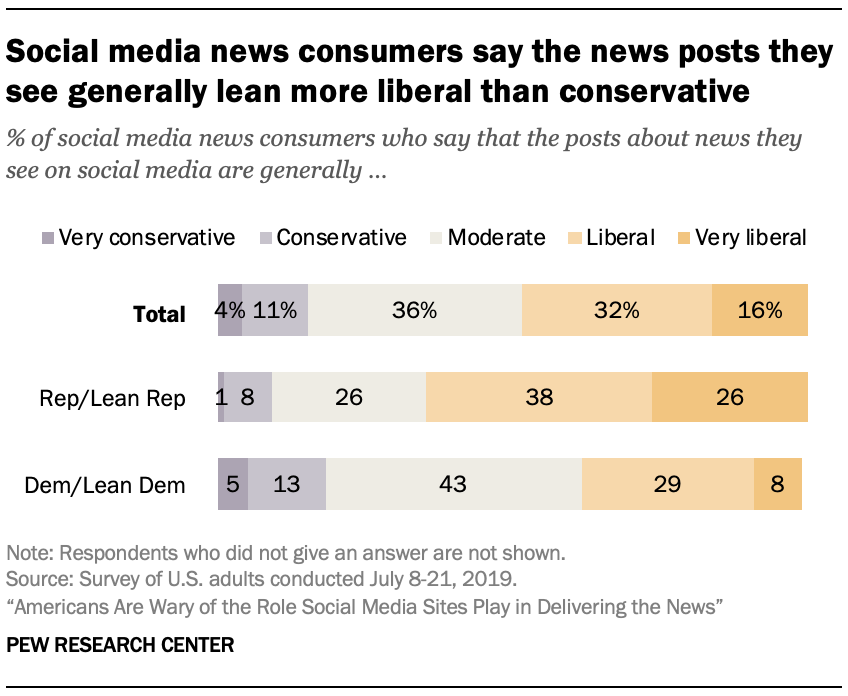
Many Americans also say that the news posts they see on social media tend to lean to the left ideologically. Nearly half of social media news consumers (48%) describe the posts about news they see there as liberal or very liberal. A much smaller share – 14% – say the news posts they see are conservative or very conservative, while 36% say the news they see is moderate.
Republicans are more likely to see a liberal lean than Democrats, a plurality of whom describe the news on social media as moderate. Among social media news consumers, Republicans are more likely to say that the news they see leans liberal or very liberal (64%) than are Democrats (37%). And social media news consumers who are conservative Republicans are especially likely to say that the news leans left: 73% describe the news posts they see as liberal or very liberal.
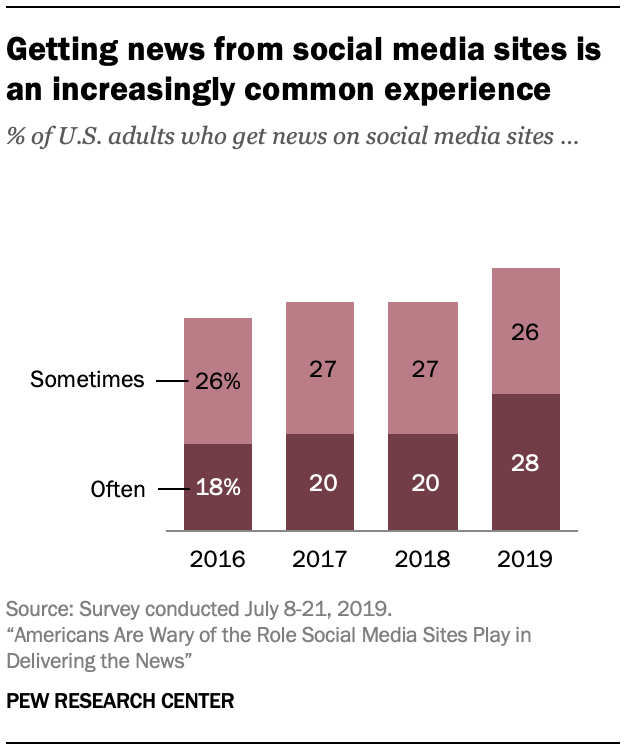
Share of Americans who get news on social media has recently increased
Getting news from social media sites is an increasingly common experience. More than half of U.S. adults get news from social media often or sometimes (55%), up from 47% in 2018. About three-in-ten Americans now get news on social media often (28%), up from 20% in 2018.
Facebook is the dominant social media news source
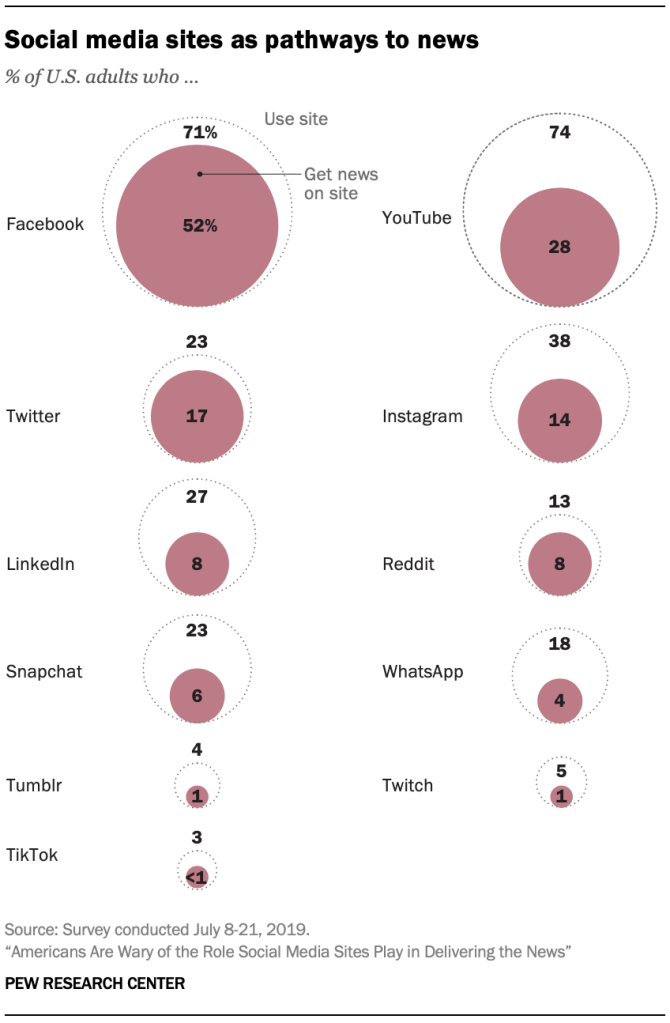
Facebook is far and away the social media site Americans use most commonly for news. About half (52%) of all U.S. adults get news there.
The next most popular social media site for news is YouTube (28% of adults get news there), followed by Twitter (17%) and Instagram (14%). A number of other social media platforms (including LinkedIn, Reddit and Snapchat) have smaller news audiences.
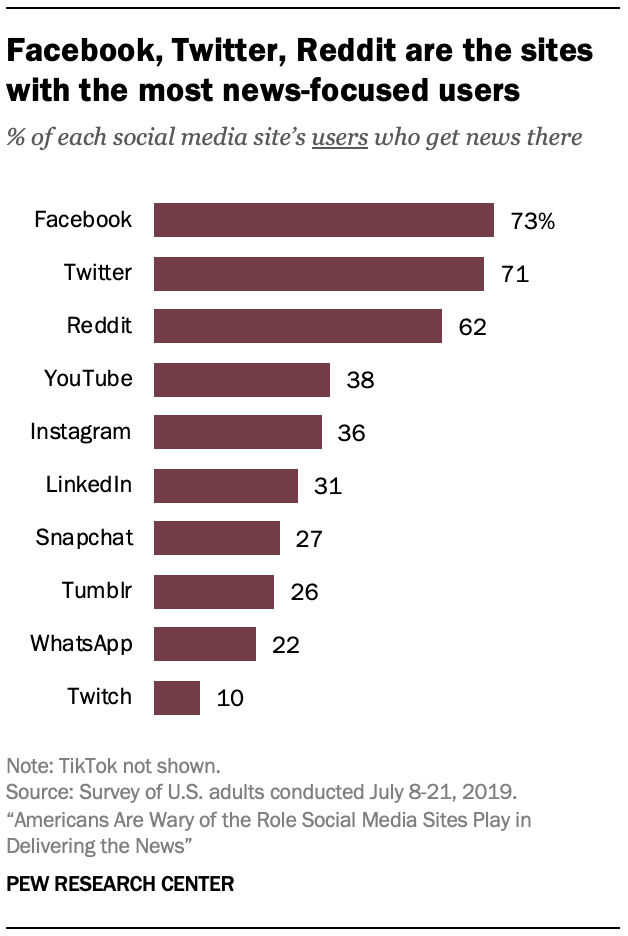
Even though news on Facebook reaches the most Americans, other sites have similarly large portions of their users getting news on their platforms.
Along with Facebook, Twitter and Reddit stand out as the sites where the highest proportion of users get news – 73% of Facebook’s users do so, as do 71% of Twitter’s and 62% of Reddit’s users. However, because Facebook’s overall pool of users is much larger than those of Twitter or Reddit, far more Americans overall get news on Facebook than on the other two sites.
The other sites studied – including YouTube, Instagram, LinkedIn, Snapchat, Tumblr, WhatsApp and Twitch – have less of a news focus among their users. Fewer than half of the users on each of these sites use the site for news. Only a small share of users of Twitch – a livestreaming website – say they get news on this platform (10%).
Demographics of American social media news consumers
The makeup of social media sites’ news users differs considerably from one site to the next. For example, white adults make up more than half of news users on Reddit (65%), Facebook (61%), Twitter (58%) and LinkedIn (58%), while there are more nonwhite news users on Snapchat and Instagram. (For most sites, black and Hispanic adults are about equally likely to get news there, but Hispanic adults are twice as likely as black adults to use Snapchat – 36% vs. 18% – and three times as likely to use Reddit, 15% vs. 5%.) Facebook, Snapchat and Instagram have a higher proportion of women among their news users, while YouTube and Reddit news users are more likely to be men. And about seven-in-ten (69%) of Snapchat’s news consumers are ages 18 to 29, more than any other site.
